#이지연
Explore tagged Tumblr posts
Text
The biggest hit song by my all-time favourite singer! "Wind, Please Stop Blowing" released in 1989 and won the Golden Cup on KBS' music show Gayo Top Ten. Here are the lyrics, translated for you guys (please credit the blog if you use the translation)
해가 뜨면 찾아올까
Will you come to look for me when the sun rises?
바람 불면 떠날 사람인데
Because you're someone who leaves when the wind blows
행요한 맘 돌아보면
When I look back, with my good heart
그댄 역시 외면하고 있네
You were, obviously, avoiding it
바람아 멈추어다오...
Oh wind, please stop blowing!
세월 가면 잊혀질까
Will I forget you as the time goes by?
그렇지만 다시 생각날 걸
But still, I keep thinking of you again
붙잡아도 소용없어
It is of no use to hold on to you
그대는 왜 멀어져가나
Why do you keep distancing yourself?
바람아 멈추어다오...
Oh wind, please stop blowing...
난 몰라...
I don't know...
바람아...
Oh, wind!
멈추어다오, 바람아...
Please stop blowing, wind
멈추어다오.
Please stop.
이젠 모두 지난 일이야
Now, that it all happened in the past
그리우면 나는 어떡하나
What should I do if I miss you?
부질없는 내 마음에
In my useless heart,
바보같이 눈물만 흐르네
I still cry tears, like a fool
바람아, 멈추어다오...
Oh wind, please stop blowing
바람아, 멈추어다오...
Oh wind, please stop blowing
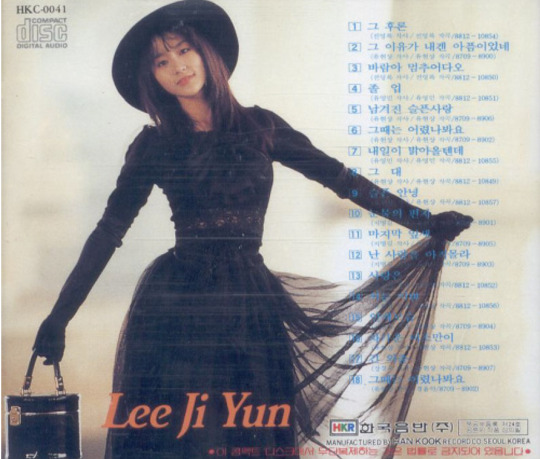
youtube



#80s nostalgia#이지연#바람아 멈추어다오#Lee Jiyeon#lee ji yeon#80s kpop#80s songs#80s#80s aesthetic#folk pop#song translation#learn korean#retro music#retro#8090s gayo#old korean pop#old korean music#OLDSCHOOL KPOP#oldschool korea#8090s gasoo#8090s singer
11 notes
·
View notes
Text
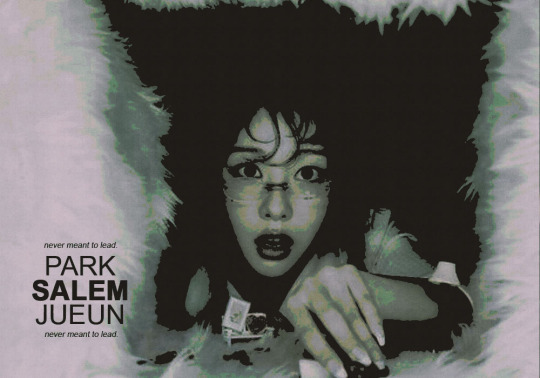
IN THE LIVING ROOM ﹙ . . . ﹚ MAGGIE ROGERS ⠀⠀" i see it now / who i was back then / so young and hungry / you loved me strong / and you were my friend / when the world felt empty. "
BIRTH NAME , ⠀⠀★⠀⠀PARK JUEUN / 주은.
STAGE NAME , ⠀⠀★⠀⠀SALEM / 세일럼.
BIRTHDATE , ⠀⠀★⠀⠀OCTOBER 31, 1998.
INSTRUMENTS , ⠀⠀★⠀⠀BASS, GUITAR, VOCALS.
ASSOCIATED ACTS , ⠀⠀★⠀⠀MOTH SIGNALS && LOOP 2002.
FACE CLAIM , ⠀⠀★⠀⠀HA SOOYOUNG / YVES
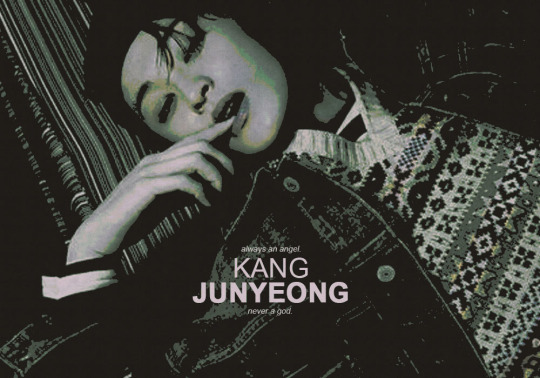
COLD COLD COLD ﹙ . . . ﹚ CAGE THE ELEPHANT ⠀⠀" my heart feels cold as ice, but it's anybody's guess / doctor, can you help me 'cause i don't feel right / better make it fast before i change my mind. "
BIRTH NAME , ⠀⠀★⠀⠀KANG JUNYEONG / 박이랑.
STAGE NAME , ⠀⠀★⠀⠀JUNYEONG / 준영.
BIRTHDATE , ⠀⠀★⠀⠀JUNE 11, 1998.
INSTRUMENTS , ⠀⠀★⠀⠀DRUMS, VOCALS.
ASSOCIATED ACTS , ⠀⠀★⠀⠀MOTH SIGNALS.
FACE CLAIM , ⠀⠀★⠀⠀MARK LEE.

PRETTY ISN'T PRETTY ﹙ . . . ﹚ OLIVA RODRIGO ⠀⠀" i chased some deal ideal my whole fucking life / and none of it matters, and none of it end / you just feel like shit over and over again. "
BIRTH NAME , ⠀⠀★⠀⠀LEE JIYEON / 이지연.
STAGE NAME , ⠀⠀★⠀⠀SERIN / 세린.
BIRTHDATE , ⠀⠀★⠀⠀JUNE 20, 2000.
INSTRUMENTS , ⠀⠀★⠀⠀GUITAR, PIANO, VOCALS.
ASSOCIATED ACTS , ⠀⠀★⠀⠀MOTH SIGNALS.
FACE CLAIM , ⠀⠀★⠀⠀PARK CHAEWON / GO WON.
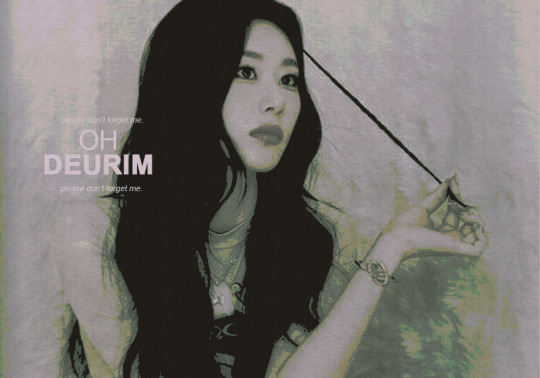
SOMEBODY COME THROUGH ﹙ . . . ﹚ WASIA PROJECT ⠀⠀" here we go again / back in the same places / why, oh why do i still feel like / nothing ever changes? "
BIRTH NAME , ⠀⠀★⠀⠀OH DEURIM / 오드림.
STAGE NAME , ⠀⠀★⠀⠀DEURIM / 드림.
BIRTHDATE , ⠀⠀★⠀⠀JULY 7, 2001.
INSTRUMENTS , ⠀⠀★⠀⠀PIANO, VOCALS.
ASSOCIATED ACTS , ⠀⠀★⠀⠀MOTH SIGNALS.
FACE CLAIM , ⠀⠀★⠀⠀LEE CHAERYEONG.
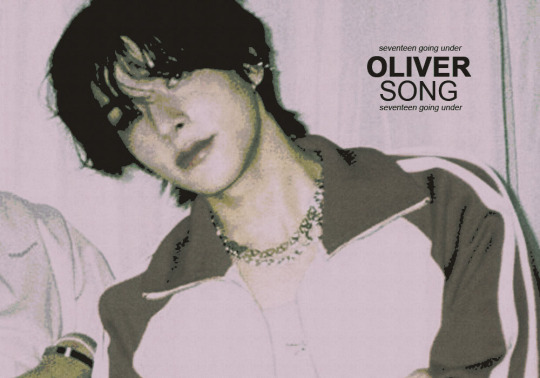
BROKEN GLASS ﹙ . . . ﹚ LIZZY MCALPINE⠀⠀" maybe it doesn't matter / who the blame gets assigned to next / nothing's ever the way that i remember it / you know i've been hurt / did i do it worse to you? "
BIRTH NAME , ⠀⠀★⠀⠀OLIVER FINN SONG.
OTHER NAMES , ⠀⠀★⠀⠀SONG JIAN / 송지안.
STAGE NAME , ⠀⠀★⠀⠀OLIVER / 올리버.
BIRTHDATE , ⠀⠀★⠀⠀DECEMBER 12, 2001.
INSTRUMENTS , ⠀⠀★⠀⠀GUITAR, VIOLIN, VOCALS.
ASSOCIATED ACTS , ⠀⠀★⠀⠀MOTH SIGNALS && ERRORZONE.
FACE CLAIM , ⠀⠀★⠀⠀JAKE SIM / SEOK MATTHEW.
#≀⠀⁺⠀˒ but now i find i’ve grown into a tall child ⠀♱ ╱ character profiles#fictional kpop community#fictional idol oc#fictional idol community#fictional kpop idol#fictional idol group#idolverse#idol oc#fake kpop group#kpop oc#kpop au#fictional idol company#fictional kpop oc#fictional kpop soloist#fake idol community#fake idol oc#fake idol soloist#fake kpop idol
35 notes
·
View notes
Text
Hey there.
Welcome to my tumblr!


These pictures above encapsulates everything I feel for the 80s-90s, especially in Korea. They are exactly my aesthetic. The aesthetic of this blog, if you so will. They are the album cover of Park Young Mi's 1st album, and a screenshot from the 1992 MBC K-drama "Sons And Daughters".
~ anemoia with a touch of obsession ~
_____________________________________________________________
"anemoia - n. nostalgia for a time you’ve never known"
"Imagine stepping through the frame into a sepia-tinted haze, where you could sit on the side of the road and watch the locals passing by. Who lived and died before any of us arrived here, who sleep in some of the same houses we do, who look up at the same moon, who breathe the same air, feel the same blood in their veins—and live in a completely different world."
______________________________________________________________
A sepia-tinted picture of a young woman, her head hung, staring into the air, obviously deep in her thoughts. Sitting on a railway track that goes far into the back and fades as it takes a turn. Her long brown ankle-length skirt that brushes the grounds and cover her white pointed boots, paired with a white blouse, give her the look of a quiet, introvert and thoughtful young girl.
Another picture, of another young girl wandering the bare train tracks, her figure blending into the mist of the morning. She seems lost but is not, she feels lonely but isn't.
I feel somewhat the same. I think about a lot of things, over- and underanalyze happenings and pop culture from that generation. It's like, I am lost a little in that time. A time that is far behind, hazy and misty in many people's memories, but still there for me to discover and enjoy. If you want to take a listen to "I Am Loneliness, You Are Longing" while scrolling down my page, here you go:
youtube
This is my profile picture btw :
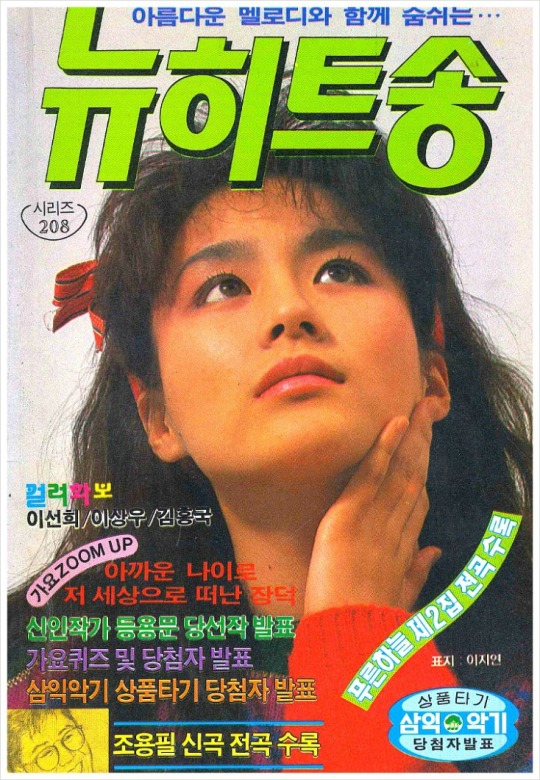
The girl here is Lee Ji Yeon, my favourite Korean singer of all times. I love her voice, her songs, her style and stage performances. You can listen to her discography or a little "Best Of" Compilation that I made:
Find my tag directory and a little introduction in the post below! Enjoy your time here, and I'd love it if you sent me an ask and interacted!
Please remember to stay kind to anyone on here, as this is a positive space for everyone! feel free to interact and hang out on here!
Love, Sea <3
#80s#retro#80s kpop#nostalgia#90s kpop#동경#80s aesthetic#aesthetic#vintage#anemoia#retrocore#vintagecore#retro aesthetic#80s music#80s pop#8090s k pop culture#8090s kdrama thoughts#8090s fashion inspo#8090s talents#8090s kpop thoughts#8090s makeup inspo#8090s kdrama pictures#8090s gayo#90s#old korean pop#old korean music#OLDSCHOOL KPOP#oldschool korea#8090s gasoo#8090s singer
30 notes
·
View notes
Text
The Lost 30 Years - Seol Woon-do/ Jin Bo-ra/ Na Hoon-a, etc. (잃어버린 30년 - 설운도/ 진보라/ 나훈아 등) - Episode 11/35 (Pt. 4)
This document constitutes the fourth segment of the Korean album 'The Lost 30 Years,' featuring notable artists such as Seol Woon-do, Jin Bo-ra, and Na Hoon-a. It will examine the broadcast schedule over the 34 days of transmission, the technologies employed in broadcasting, and additional relevant topics. For a thorough understanding, readers are encouraged to consult part one, which outlines the album's context, the background of the broadcast, program planning, and content, along with parts two and three that provide an in-depth analysis of the broadcast itself. The live broadcast initiated on June 30, 1983, followed by an emergency broadcast relay from July 1 to July 10, 1983, and resumed regular programming from July 15, 1983, until November 14, 1983.
Broadcast List:
To ensure that these historical records are accessible to descendants and the global community, KBS digitized all episodes of Searching for Separated Families and began uploading them to YouTube on March 5, 2014. Subsequently, in October 2015, this initiative was recognized as a UNESCO Memory of the World.
Continuation from Part 3
Day 8, recorded on July 15, 1983, Friday, to July 16, Saturday, from 10:15 PM to 2:50 PM, was moderated by Yoo Cheol-jong (유철종) and Lee Ji-yeon (이지연).
Video Links - #1, #2, #3, #4, #5, #6, #7, #8, #9, #10, #11 #12, #13, #14, #15
Day 9, recorded on July 22, 1983, Friday, to July 23, Saturday, from 10:15 PM to 1:45 PM, with moderators Yoo Cheol-jong and Lee Ji-yeon.
Video Links - #1, #2, #3, #4, #5, #6, #7, #8, #9, #10, #11, #12, #13, #14
On the 10th day, specifically dated July 29, 1983, Friday, to July 30, Saturday, from 10:15 PM to 6:00 PM, the moderators included Yoo Cheol-jong, Lee Ji-yeon, Hwang In-yong (황인용), and Kang Bu-ja (강부자).
Video Links - #1, #2, #3, #4, #5, #6, #7, #8, #9, #10, #11, #12, #13, #14, #15
Day 11, recorded on August 5-6, 1983, from 10:15 PM to 6:00 PM, features moderators Yoo Cheol-jong, Lee Ji-yeon, Kim Dong-gun (김동건), and Shin Eun-kyung (신은경).
Video Links - #1, #2, #3, #4, #5, #6, #7, #8, #9 , #10, #11, #12, #13, #14, #15, #16
Day 12, recorded on August 12, 1983, spanned from 10:15 PM to 3:20 PM the next day, featuring moderators Yoo Cheol-jong, Lee Ji-yeon, Kim Dong-gun, and Shin Eun-kyung. This session was part of a special program commemorating Liberation Day.
Video Links - #1, #2, #3, #4, #5, #6, #7, #8, #9, #10,#11, #12, #13, #14, #15, #16
Day 13, recorded from 11:50 PM on Saturday, August 13, 1983, to 2:25 AM on Sunday, August 14, 1983, and resuming from 7:00 AM to 5:25 PM on the same day, was facilitated by Yoo Cheol-jong and Lee Ji-yeon as part of a special program commemorating Liberation Day.
Video Notes August 13 - #1, #2, #3 Video Notes August 14 - #4, #5, #6, #7, #8, #9, #10, #11, #12
On August 15, 1983, known as Liberation Day, the event's moderators, who facilitated the proceedings from 12:10 AM to 6:00 PM, were Kim Dong-gun, Shin Eun-kyung, Yoo Cheol-jong, and Lee Ji-yeon. The auxiliary activities were coordinated by Son Seok-gi (손석기) and Kim Mi-hoe (김미회) at the Public Hall as part of the special program for Liberation Day.
Video Links - #1, #2, #3, #4, #5, #6, #7, #8, #9, #10, #11, #12, #13, #14, #15, #16
Day 15, recorded on August 19-20, 1983, from 10:15 PM to 3:10 PM, featured moderators Yoo Cheol-jong, Lee Ji-yeon, Kim Dong-gun, and Shin Eun-kyung.
Video Links - #1, #2, #3, #4, #5, #6, #7, #8, #9, #10, #11, #12, #13, #14, #15
Day 16, recorded on August 26, 1983, from 10:15 PM to 3:00 AM, continuing into August 27, 1983, from 7:50 AM to 2:10 PM, featured moderators Yoo Cheol-jong and Lee Ji-yeon.
Video Links - #1, #2, #3, #4, #5, #6, #7, #8, #9, #10
Day 17, recorded on September 2, 1983, Friday, through September 3, Saturday, from 10:15 PM to 3:00 AM, continuing until 8:10 AM on September 3, Saturday, with the moderators being Yoo Cheol-jong and Lee Ji-yeon.
Video Links - #1, #2, #3, #4, #5, #6, #7, #8, #9, #10
Day 18, recorded on September 9, 1983. From 10:15 PM on Friday, September 9, to 3:00 AM on Saturday, September 10, and continuing from 8:00 AM to 4:30 PM on the same day, the moderators overseeing the proceedings were Yoo Cheol-jong and Lee Ji-yeon.
Video Links - #1, #2, #3, #4, #5, #6, #7, #8, #9, #10, #11, #12, #13
Day 19, recorded on September 16, 1983, spanned from 10:15 PM to 3:00 AM, and resumed on September 17, 1983, from 8:00 AM to 6:10 PM, with moderators Yoo Cheol-jong and Lee Ji-yeon overseeing the Chuseok special program.
Video Links - #1, #2, #3, #4, #5, #6, #7, #8, #9, #10, #11, #12, #13, #14
On September 17, 1983, the event commenced at 11:30 PM and extended until 3:20 AM, transitioning into September 18, 1983. The session reconvened from 8:50 AM to 5:40 PM, under the supervision of moderators Kim Dong-gun and Lee Kang-ja, as part of a Chuseok special program.
Video Links - #1, #2, #3, #4, #5, #6, #7, #8, #9, #10, #11, #12
On September 18, 1983, designated as Day 21, the scheduled activities commenced at 11:40 PM on Monday, September 19, and extended until 3:00 AM, resuming at 9:20 AM and concluding at 5:20 PM on the same day. The events were supervised by moderators Yoo Cheol-jong and Lee Ji-yeon, as part of a special Chuseok program.
Video Links - #1, #2, #3, #4, #5, #6, #7, #8, #9, #10, #11, #12, #13
Day 22, recorded on September 19, 1983, spanned from 10:15 PM to 4:10 AM, extending into September 20, 1983, from 9:20 AM to 5:30 PM, with Kim Dong-gun and Lee Kang-ja acting as moderators for a Chuseok special program.
Video Links - #1, #2, #3, #4, #5, #6, #7, #8, #9, #10, #11, #12, #13, #14
Day 23, recorded on September 23, 1983, through September 24, 1983, from 10:30 PM to 4:00 AM and continuing on September 24 from 8:00 AM to 6:10 PM, featured moderators Yoo Cheol-jong, Lee Ji-yeon, Kim Dong-gun, and Lee Kang-ja (이강자). The total broadcast duration surpassed 300 hours.
Video Links - #1, #2, #3, #4, #5, #6, #7, #8, #9, #10, #11, #12, #13, #14, #15, #16
Day 24, recorded on September 24, 1983, spans from Saturday night at 10:50 PM to Sunday morning at 3:30 AM, continuing until 8:10 AM on September 25, 1983, and concluding at 3:10 PM. The moderators overseeing this period were Kim Dong-gun, Lee Kang-ja, Yoo Cheol-jong, and Lee Ji-yeon.
Video Links - #1, #2, #3, #4, #5, #6, #7, #8, #9, #10, #11, #12
Day 25, recorded on September 29, 1983, Thursday, to September 30, Friday, from 10:15 PM to 10:00 AM, featured moderators Kim Dong-gun and Lee Kang-ja, highlighting the October Holiday Special Program.
Video Links - #1, #2, #3, #4, #5, #6, #7, #8, #9, #10
Day 26, recorded on October 1, 1983, from 10:15 PM to 3:00 AM, and continuing on the same day from 8:00 AM to 3:40 PM, the moderators for the October Holiday Special Program were Yoo Cheol-jong, Lee Ji-yeon, Kim Dong-gun, and Lee Kang-ja.
Video Links - #1, #2, #3, #4, #5, #6, #7, #8, #9, #10, #11, #12, #13
On Day 27, recorded on October 1, 1983, the activities spanned from Saturday night at 10:40 PM to Sunday morning at 3:35 AM, continuing into October 2, 1983, from 8:10 AM to 5:20 PM. The moderators for this October Holiday Special Program included Kim Dong-gun, Lee Kang-ja, Yoo Cheol-jong, and Lee Ji-yeon.
Video Links - #1, #2, #3, #4, #5, #6, #7, #8, #9, #10, #11, #12, #13, #14
Day 28, recorded on October 3, 1983, during the early hours from 12:05 AM to 3:20 AM, and again from 6:00 AM to 7:00 AM, followed by a session from 10:30 AM to 4:05 PM, the moderators Yoo Cheol-jong, Lee Ji-yeon, Kim Dong-gun, and Lee Kang-ja facilitated the October Holiday Special Program.
Video Links - #1, #2, #3, #4, #5, #6 (This recording did not record any audio), #7, #8, #9, #10
Day 29, recorded on October 3, 1983, from 11:15 PM to 3:00 AM, featured moderators Yoo Cheol-jong and Lee Ji-yeon for the October Holiday Special Program.
Video Links - #1, #2, #3, #4
On the 30th day, dated October 6, 1983, from 10:45 PM to 3:00 AM, and continuing on October 7, 1983, from 6:10 AM to 10:00 AM, the moderators were Yoo Cheol-jong and Lee Ji-yeon.
Video Links - #1, #2, #3, #4, #5, #6, #7, #8
Day 31, recorded on October 7, 1983, from 11:20 PM to 4:00 AM, and continuing on October 8, 1983, from 1:00 PM to 5:50 PM, the moderators overseeing the sessions were Kim Dong-gun, Lee Kang-ja, Yoo Cheol-jong, and Lee Ji-yeon.
Video Links - #1, #2, #3, #4, #5, #6, #7, #8, #9, #10
On Day 32, documented on October 8, 1983, the event was moderated by Kim Dong-gun, Lee Kang-ja, Yoo Cheol-jong, and Lee Ji-yeon. The sessions commenced at 10:40 PM on October 8 and concluded at 3:00 AM on October 9, with a subsequent session running from 10:30 AM to 4:50 PM on the same day. The audio (Video 10) features a special news report regarding the bombing at Aung San Mausoleum, along with recordings of the public hall where the audience was gathered at that time.
Video Links - #1, #2, #3, #4, #5, #6, #7, #8, #9, #10
On Day 33, spanning from October 14 to October 15, 1983, the moderators overseeing the event were Yoo Cheol-jong, Lee Ji-yeon, Kim Dong-gun, and Lee Kang-ja. The activities took place from 11:15 PM to 4:00 AM, and continued the following day from 8:10 AM to 4:50 PM.
Video Links - #1, #2, #3, #4, #5, #6, #7, #8, #9, #10, #11, #12
On Day 34, spanning from October 21, 1983, at 10:15 PM to October 22, 1983, at 1:00 PM, the final day of the broadcast occurred.
Video Links -#1, #2, #3, #4, #5, #6, #7, #8
Broadcasting Technology
In the past, broadcasting technology in Korea relied heavily on imported equipment from countries like Japan, which, by contemporary standards, was quite rudimentary. Unlike today's capabilities for simultaneous broadcasting across multiple platforms, the KBS Seoul Yeouido headquarters could only mix audio with regional stations, lacking the ability to display video. This limitation was starkly contrasted by the United States, which, during news broadcasts, could connect three locations simultaneously and present them on screen. In Korea, the visual output was limited to a single screen that could only partially display the transmitted content, often resembling an erasure effect when transitioning between scenes.
As technology progressed, Korea managed to achieve a rudimentary form of dual broadcasting by overlaying images from different regional stations. This was accomplished using electrical analogy equipment, a significant departure from the digital methods employed today, such as chroma keying or green screen technology. The distinction between electrical and electronic systems lies in the method of image display; current digital systems utilize computer RAM to manage image data, while earlier systems relied on physical overlays of electrical signals. By 1983, the US had already integrated computers into their broadcasting equipment, highlighting a technological gap that Korea was striving to bridge.
Seoul KBS operates a studio in Yeouido, housed within its main building, which was completed in 1976, making it relatively new at that time. The annex, the former TBC building, was finished in 1980. Despite featuring modern facilities, it fell short of the operational expertise found in the United States and Japan. The broadcast subtitles, referred to as 'Supa,' derived from the term 'superimpose,' reflect a mispronunciation of the Japanese word for super (スーパーインポーズ). Unlike contemporary methods that allow for quick text entry via a keyboard, the subtitle creation process involved calligraphy or typesetting, necessitating scanning for display. Consequently, during the initial three days of broadcasting, regional station identifiers were inconsistently shown, and discrepancies in font and subtitle positioning arose between Seoul and the regional stations. In 1981, the introduction of the CG-800 computer character generator from Japan's Kowa marked a technological advancement, although its application was restricted to news programming.
The early broadcast footage reveals a stark contrast in image quality between the Seoul broadcast and local stations. The equipment utilized in Seoul was on par with that of Japan, having been upgraded in anticipation of the Seoul Olympics. In contrast, local broadcasting stations were limited to only two or three cameras and inadequate lighting, resulting in poor white balance and depth. In metropolitan areas like Daejeon, audio issues were prevalent, with significant howling during connections, necessitating the use of earphones by local guests. Furthermore, while KBS headquarters began broadcasting dynamic images and animations on its channels as early as 1984, regional stations lagged behind, primarily showing still images until the early 1990s.
During this period, the integration of SNG technology enabled live broadcasts not only from the Seoul KBS headquarters but also from various regional stations. Although the broadcasting technology of the time was rudimentary compared to contemporary standards, significant advancements were made through the tumultuous live broadcasts of major events, including the 1986 Seoul Asian Games and the 1988 Seoul Olympics. These developments marked a pivotal moment in the evolution of Korean broadcasting technology.
Other matters than Broadcasting:
Additional concerns beyond broadcasting involve events occurring outside the broadcasting station, including the incorporation of songs and responses from international audiences.
Yeouido Meeting Square
On the inaugural day of the live broadcast, both the area in front of the KBS main building and Yeouido Plaza, along with the entirety of Yeouido Park, underwent a transformation into an asphalt plaza.

On July 1, families separated by circumstances began an overnight vigil at the KBS Central Hall, driven by the cessation of application acceptance due to an overwhelming influx. In this context, Kwak Man-young (곽만영), a key figure in the narrative of sibling reunification, became the first to display posters on the walls and pillars of the KBS main building, marking the beginning of a grassroots movement for family reconnection.
Within a few days, the posters proliferated throughout the main building, reaching even the highest pillars. The once-visible windows and vents of the KBS structure became obscured by the sheer volume of messages. The initiative soon expanded beyond the building, spilling into Yeouido Plaza, where some individuals experienced fortunate reunions after their posters were displayed. However, the majority faced the grim reality of searching for their loved ones, often resorting to unconventional methods to ensure their messages stood out amidst the deluge of posters.
youtube
The desperation of those seeking their families led to the transformation of the area surrounding KBS into a makeshift tent village, with many individuals foregoing basic necessities like food and water. Notably, even Seol Woon-do (설운도), a guest performer, was moved by the plight of the families and chose to sleep alongside them, sharing in their struggle. This collective effort highlighted the profound human desire for connection and the lengths to which individuals would go to reunite with their loved ones.

This photo was later attached to the 2nd semester 5th grade social studies textbook of the Ministry of Education.
On July 9, the initiative to reunite separated families escalated into a national movement, prompting the establishment of a 'Meeting Square' at the site of the Korea Industrial Bank, which officially opened on August 5. This space featured amenities such as a water fountain, medical facilities, and a mobile public telephone, with support from the Telecommunications Corporation, the Ministry of Post and Telecommunications, and the Railway Administration Branch Office. According to Son Gil-shin (손길신), the director of the Railway Museum at that time, once families were identified, they received travel tickets and accommodations in designated areas, including the five northern provinces, unrecovered regions of Gyeonggi-do and Gangwon-do, as well as Sakhalin, China, Japan, and other countries with significant Korean populations.
The Meeting Square was organized to facilitate the identification of separated families, with sections and tents set up for this purpose. Non-commercial items were made available at the plaza, as well as at KBS regional stations and municipal offices. Additionally, legal professionals, including lawyers and administrative scribes, volunteered their services to provide guidance on post-reunion legal matters, such as name changes, inheritance issues, and family registration processes. KBS managed the Meeting Square for a full year, continuing its support for separated families until the following summer, after the broadcast concluded in November.
Individuals present at the Meeting Square, including broadcaster Lee Sang-byeok (이상벽) and photographer Jo In-hwan (조인환), later reflected on the atmosphere of the space. They noted that amidst the numerous pieces of paper affixed to the walls and floors, no one added their own notes to those already posted by others. This behaviour highlighted a profound sense of consideration among attendees, who, despite their urgent desire to reunite with their families, respected the shared experience of others in similar circumstances.
Insert Song
youtube
These two songs serve as exemplars, and the video above has been uploaded directly from the KBS account.
The initial broadcast featured a segment where performers emerged to establish a musical ambiance. On that first day, Hyun In (현인) and Kim Yeon Ja (김연자) delivered a poignant song, while the announcers briefly paused to receive guidance from the production director, serving as a transitional element. However, the production team quickly recognized that such direction was unnecessary, as the audience, comprised largely of separated families, began to weep uncontrollably during the storytelling segments. As the second day unfolded, the public hall became chaotic with the presence of separated families, production staff, and journalists, leading Kim Yeon Ja to perform only one song after enduring a 16-hour wait. Subsequently, background music was played, and camera operators focused on the audience's signs, with the singers returning to perform once the program resumed its regular schedule. From that point onward, Seol Woon Do (설운도) became a frequent presence in the public hall.
The original title, "Who Doesn't Know This Person?", was relatively obscure prior to its broadcast. This song, performed by Kwak Soon-ok (곽순옥), served as the theme for the 1964 radio drama "South and North," written by Han Woon-sa (한운사). When the broadcast was scheduled in 1983, Kwak Soon-ok, residing in Hong Kong at the time, was unable to perform the title track, leading to Patty Kim, a close associate, taking her place. As the program aimed at reuniting separated families progressed, Kwak Soon-ok made a special appearance to perform the song, credited under her original title, "South and North." The drama was later adapted into a film featuring Shin Young-kyun (신영균) and Um Aing-ran (엄앵란), with a subsequent remake starring Shin Il-ryong (신일룡) and Won Mi-kyung (원미경). In the early 1990s, MBC produced another version with Park Sang-won (박상원), Lee Mi-sook (이미숙), and Gil Yong-woo (길용우), during which the song's title replaced the original "South and North." Surprisingly, two decades later, in the 2000s, it began to be utilized as a sound effect in response to unfortunate events on variety shows. A similar instance is the song "You," performed by Kim Jeong-ho (김정호) shortly before his passing; this poignant track, imbued with feelings of resentment, has also found frequent use in entertainment programming since the early 21st century.
Who doesn't know this person? With a gentle body, shining eyes, and a kind heart like the moon, Who doesn't know this woman who swore with me by the riverside that she would go to the ends of the earth ? Who doesn't know this person? With soft passion and brightness, once you give your heart, it won't change. Who doesn't know this woman who swore in my arms that she would follow my dreams and follow me ? --- 누가 이 사람을 모르시나요 얌전한 몸매에 빛나는 눈 고운 마음씨는 달덩이같이 이 세상 끝까지 가겠노라고 나 하고 강가에서 맹세를 하던 이 여인을 누가 모르시나요 누가 이 사람을 모르시나요 부드러운 정열에 화사한 이 한 번 마음주면 변함이 없어 꿈 따라 임 따라 가겠노라고 내 품에 안기어서 맹세를 하던 이 여인을 누가 모르시나요 --- English & Korean Lyrics of 'Who doesn't know this person'
Following the standard airing, the title would be altered to Seol Woon-do's 'The Lost 30 Years.'
Rain or shine, wind or shine For thirty years of missing each other How much did I cry, feeling sad for this body that had nowhere to rely on? My brothers and I, may we meet again and share the love we couldn't share, Where are you, Mother and Father? I sing with a choked voice. Will it be tomorrow or the day after? Thirty years of waiting, filled with tears How much did I cry, feeling sad for losing my hometown? My brothers and I, may we meet again and share the love we couldn't share, Where are you, Mother and Father? I sing with a choked voice -Full --- 비가오나 눈이오나 바람이 부나 그리웠던 삼십년 세월 의지할 곳 없는 이 몸 서러워하며 그 얼마나 울었던가요 우리 형제 이제라도 다시 만나서 못다한 정 나누는데 어머님 아버님 그 어디에 계십니까 목메이게 불러 봅니다 내일일까 모레일까 기다린 것이 눈물 맺힌 삼십년 세월 고향 잃은 이 신세를 서러워하며 그 얼마나 울었던가요 우리 남매 이제라도 다시 만나서 못다한 정 나누는데 어머님 아버님 그 어디에 계십니까 목메이게 불러 봅니다 --- English and Korean lyrics of 'Lost 30 Year'.
Seol Woon-do, at the age of 26, made his debut in 1981 through KBS's "Birth of a New Artist" program, yet remained largely unrecognized for nearly two years. His breakthrough came when his agency, after viewing the program, recognized his potential and swiftly recorded a revised version of his song "To My Father," which was released in 1982. The following day, the song gained immense popularity, leading to an emotional family gathering as they witnessed his success. The agency explained that Seol Woon-do was the only artist available for the broadcast at that time. In the program's early days, his manager had to hold the lyrics for him, as he struggled to memorize them. Seol Woon-do recounted waiting all day with the announcers, and when the producer finally called for him, he performed on stage, singing "The Lost 30 Years" repeatedly. He described being so immersed in the emotional atmosphere that he lost track of his performance, often feeling as if he were possessed by the moment, with the song resonating deeply even in his everyday life.
Numerous songs capitalized on prevailing trends during this period, including one titled "Separated Family." The artist Jeon Mi-kyung (전미경), who performed this piece, also sang "Jang Nok-su," (장녹수) which was featured in the drama of the same name twelve years later. Additionally, various songs, including children's songs like "Our Wish," "Longing for Geumgangsan," and "Taogi," were incorporated into the media. Notably, Jo Young-nam (조영남), a displaced individual from Pyeongsan-gun in Hwanghae-do, performed "Our Wish," which served as the closing theme for a program airing at the time the government initiated a nationwide campaign to locate separated families.
Our wish is unification Even in our dreams, our wish is unification We dedicate our lives to unification , unification, come. Unification that will save this people, to find my country, unification, unification, come quickly , unification , come. Our wish is unification Even in our dreams, our wish is unification We dedicate our lives to unification, unification, come. The way to find my country, unification , unification, to save this people, unification, come quickly, unification, come. --- 우리의 소원은 통일 꿈에도 소원은 통일 이 정성 바쳐서 통일 통일이여 오라. 이 겨레 살리는 통일 내 나라 찾는데 통일 통일이여 어서 오라 통일이여 오라. 우리의 소원은 통일 꿈에도 소원은 통일 이 목숨 바쳐서��통일 통일이여 오라 내 나라 찾는길 통일 이겨레 살리는 통일 통일이여 어서 오라 통일이여 오라. --- Full text of the lyrics both in English and Korean of 'Our Wish' sung by Jo Young-nam. The lyrics in bold are different from the original.

KBS subsequently published a compilation of insert songs performed by multiple artists, featuring tracks such as "Lost 30 Years" and "Who Doesn’t Know This Person?" The album is titled "Lost 30 Years." Seol Woon-do has mentioned that he still possesses this album in his home.

These documents pertain to the live broadcast that occurred during that period. Additionally, these commemorative records have been designated as UNESCO World Heritage.
Overseas Reactions
"The national significance of the Family Reunification Program is reflected by its impact on the Korean people. The television program was the first use of mass media to facilitate postwar reunification and had the widest public participation of any Korean broadcast. (Omitted) Nevertheless, the Family Reunification Program had great global significance in revealing lesser-known consequences of the Cold War and the Korean War. In an era when widespread access to television was just beginning, the Family Reunification Program provided one of the first vivid accounts of the consequences of war on civilians." - English Wikipedia
In 1983, UN Secretary-General Javier Pérez de Cuéllar conveyed profound sympathy and comprehension regarding the plight of separated families during a discussion with South Korean Ambassador to the UN, Kim Kyung-won (김경원). Additionally, a group of 17 representatives from seven nations, alongside a delegation from the International Federation for Human Rights, visited the site during the 70th Inter-Parliamentary Union (IPU) General Assembly in Seoul. Meanwhile, journalists from 25 countries occupied the press room established in the KBS main building, providing real-time coverage of the reunions to a global audience. The broadcast elicited an enthusiastic response, and its historical importance during the Cold War was underscored by extensive coverage from major media outlets in the United States and Japan. The accompanying video, submitted to UNESCO, features AP's teletype transmission, a report from ABC on July 3, and coverage from TBS TV in Japan, including a segment of then US President Ronald Reagan's speech advocating for North Korea's involvement in the program.
This broadcast was recognized as the 'Most Humanitarian Program of 1983' during the 6th World Conference of Journalists, which took place in Cartagena, Colombia, from September 6 to 9, 1983. Additionally, it received the 'Gold Mercury Ad Horneram Award' at the 24th Gold Mercury World Peace and Cooperation Conference in Gabon on February 17, 1984, marking a significant achievement for the broadcasting organization. Furthermore, it was incorporated as a textbook in broadcasting studies at the University of Greenwich in England.
The program played a crucial role in highlighting the plight of families separated by the division of North and South Korea, elevating the issue to an international platform. In 1983, Yoo Chang-soon (유창순), then President of the Korean Red Cross, called for the resumption of inter-Korean talks, emphasizing the urgency of addressing the separated families' situation. Both President Chun Doo-hwan (전두환) and U.S. President Ronald Reagan expressed their support for family reunification. These collective efforts culminated in 1985, when a North Korean delegation visited KBS, facilitating the first reunion of separated families between the two Koreas.
Idea provider, President Lee Won-hong
Ahn Guk-jeong (안국정), the architect behind the program, revealed in the September 15, 1999 edition of the Chosun Ilbo's serialized project 'Adieu... 20th Century' - 'Live Broadcast to Find Separated Families', that the initiative was inspired by Lee Won-hong (이원홍), the then-president. In his account, President Lee commended Ahn for his successful live broadcast 'Nakdonggang 1300-ri', which highlighted the reunions of survivors from the Battle of Nakdonggang, and subsequently suggested the concept of reuniting separated families from both South and North Korea.
While the original vision may have aimed at facilitating reunions across the Korean divide, practical considerations necessitated a focus on reunions within South Korea due to the complexities involved in negotiating with North Korea. The program ultimately emerged from an unforeseen proposition: "What if we could connect through television in this manner?" This shift in focus reflects the challenges of addressing the sensitive issue of family separations in the context of inter-Korean relations.
Psychological warfare against NK
The report by 'Tongil News' regarding the contents of declassified diplomatic documents suggests that the initiative to broadcast programs aimed at reuniting separated families was initially conceived as a tool for psychological warfare. However, an analysis of the broadcast content indicates that the relevant document was likely drafted after the commencement of the broadcasts. The Ministry of Foreign Affairs issued a directive in 1983, which was later declassified in 2014, instructing diplomatic missions to leverage this program for psychological operations against North Korea and for security education purposes, yet it did not mandate the creation of the broadcast itself. KBS and the government, responsible for the live broadcast, framed their efforts as a humanitarian endeavor.
In summary, a review of both the disclosed documents and the broadcast content implies that the initiative was not meticulously designed for psychological warfare. Instead, it appears that, following its success and popularity, a directive was issued to utilize the broadcast for propaganda and psychological influence. Thus, while the original intent may not have been to employ the broadcast as a weapon of psychological warfare, it became a tool for such purposes after its launch, with notable figures, including Chun Doo-hwan (전두환), later participating in the initiative.

Some contend that the government orchestrated the broadcasts as a form of psychological warfare against the North, citing inaccuracies in the live broadcast dates. However, this assertion is misguided. Initially, the broadcasts did not anticipate an extension beyond the first three days. The comprehensive live coverage persisted until July 4, with the production and airing of the program commencing on that date. Notably, there were variations in the structure of the opening, commentary, and the first hour of the broadcast, as well as coordination with local broadcasters. The transition to regular broadcasting occurred on July 5.
The elements that could be interpreted as propaganda or psychological warfare in the commentary began to surface on the third day, specifically during the segment hosted by announcer Kim Dong-geon (김동건). In contrast, the broadcasts on the first two days did not include such content. On the second day, a political reporter provided a brief overview of the historical division between the South and North, but the report became increasingly ambiguous as the reunion scenes unfolded. Furthermore, on the inaugural day, there was no indication of when the broadcast would take place, suggesting a lack of planning for an all-day live event, as evidenced by comments indicating surprise at the duration of the broadcast.
On July 10, the State Council officially passed a resolution to initiate a nationwide movement, akin to the Saemaul Movement, spearheaded by the Korean Red Cross. This external impetus yielded significant outcomes, as evidenced by the North Korean Red Cross's delivery of relief supplies and rice to the South during the catastrophic Han River flood in 1984. Additionally, in 1985, the first reunions of separated families and exchanges of art troupes between the two Koreas were facilitated through the Red Cross. Notably, announcer Kim Dong-gun served as the main MC during this period.
KBS special live broadcast 'Finding Separated Families' records
youtube
This documentation highlights the somber realities of the Cold War and the associated atrocities experienced in South Korea. The poignant moments of family members reuniting, embracing, and weeping not only alleviated the anguish of those separated but also acted as a significant impetus for the inaugural reunion of divided families between the South and North in September 1985. This event played a crucial role in reducing hostilities on the Korean Peninsula and conveyed a universal message advocating for peace, emphasizing the need to prevent such tragedies from recurring. Furthermore, this record stands as a significant achievement in the realm of global broadcasting history. It represents the largest television initiative aimed at reuniting separated families, with 100,952 applications submitted. Of these, 53,536 cases were featured on air, resulting in the reunion of 10,189 families. The program was supported by a dedicated team of 1,641 broadcast professionals and was aired over a span of 138 days. - UNESCO Korean National Commission
In March 2014, KBS submitted an application to the Cultural Heritage Administration to have the records of the “Finding Separated Families” program recognized as a World Memory Heritage. In collaboration with the government, KBS aimed to promote the registration of all associated records under this designation. By January 2015, the UNESCO International Advisory Committee for the Memory of the World recommended the registration, which was subsequently reviewed by a subcommittee in Abu Dhabi, UAE, from September 28 to 30, 2015.
On October 9, 2015, UNESCO officially designated the recordings from the “Finding Separated Families” program as a World Memory Heritage, alongside Korean Confucian textbooks. This achievement made KBS the second television broadcaster globally, after Germany's Berlin Brandenburg Broadcasting Company, to receive such recognition for documentary heritage. The designation encompasses not only 463 original recording tapes but also various materials such as production notebooks, applications from separated families, broadcast schedules, cue sheets, commemorative albums, and photographs, totalling 25,222 items. These documents serve as primary sources that substantiate historical facts and have been preserved in the KBS archives since their creation, while most records from central and local governments are housed in the National Archives.

Collection of records
Consequently, the Republic of Korea's total count of World Documentary Heritage items has risen to 13, and as of 2023, this number has further increased to 18, positioning the nation as the fourth highest globally. KBS prominently featured this achievement as the leading headline on News Square the following morning. The broadcast was lauded for its record-setting continuous live coverage of 453 hours and 45 minutes, which not only highlighted the anguish of war but also encouraged participation from diverse segments of society. This unique record encapsulates the tragic Cold War experiences in Korea and the suffering of families separated by division, earning its registration based on the critical criteria of authenticity, originality, and global significance, while conveying a universal message of peace against the backdrop of the Korean War.
In this instance, the registration encompassed not only the broadcast but also various documents and testimonies. This marks the second occasion where a broadcast has been the primary focus of such recognition, following the listing of the film Metropolis in 2001, which was produced in 1927. Professor Seo Kyung-ho (서경호) from Seoul National University, a former international advisory member of the Memory of the World Committee, remarked that this is indeed the first instance of a television broadcast program being included. He noted that most records associated with the Berlin Wall consist of documents and testimonies, with only a few broadcasts being recognized.
Professor Seo emphasized that the KBS program aimed at reuniting separated families is fundamentally a broadcast at its essence. He suggested that this recognition could pave the way for more broadcast programs to be considered for inclusion in the Memory of the World list in the future, thereby expanding the scope of what constitutes significant documentary heritage. This development underscores the evolving nature of heritage recognition, highlighting the importance of audio-visual media in documenting historical narratives.

The archive consists of 463 digital Betacam tapes that capture the broadcast. These recordings span from 10:15 PM on June 30, 1983, to 4 AM on November 14, extending into the early hours.
Meaning of the special broadcast
The KBS special live broadcast titled 'Searching for Separated Families' holds the distinction of being the longest continuous broadcast by KBS, spanning 138 days from June 30, 1983, to November 14, 1983. This documentary serves as a poignant reminder of the imperative to prevent future wars. It marked a significant moment in the use of mass media for promoting unification efforts post-war, engaging the public in a manner unprecedented in Korean broadcasting history. The program illuminated the consequences of the Cold War and the Korean War, bringing to light the previously obscured realities of these conflicts and their impact on South Korea.
The emotional reunions depicted in the broadcast, where family members embraced and wept, played a crucial role in alleviating the suffering of those separated by war. This heartfelt portrayal not only provided solace to affected families but also acted as a catalyst for the first official reunions between separated families from the North and South in September 1985. Ultimately, the broadcast conveyed a powerful message of peace, underscoring the necessity of preventing such tragedies from recurring in the future.
------------------------------------------------------
There are issues with adding the video links; however, the entire page containing this information includes all the links. I will maintain a count of the videos to indicate how many are available for each day.
#history#korean history#korea#korean music history#south korea#photography#music history#Youtube#80s#80s music#KBS#The Lost 30 Years - Seol Woon-do/ Jin Bo-ra/ Na Hoon-a ect.#잃어버린 30년 - 설운도/ 진보라/ 나훈아 등#The Lost 30 Years#잃어버린 30년
5 notes
·
View notes
Text
𝙁𝘼𝘾𝙀 𝘾𝙇𝘼𝙄𝙈.

Name : Leejung Lee (이리정)
DOB : August 9, 1998
Height : 160 cm
Blood Type : A
Nationality : Korean
Leejung Lee (Korean: 이이정; born August 9, 1998) is a South Korean choreographer and dancer as part of NWX, a dance division of YGX. She steadily gained recognition as the youngest and first female recruit of the "world-class" dance crew, Just Jerk, and propelled to domestic stardom following her appearance on Street Woman Fighter (2021).

Stage Name: NO:ZE (also stylised as Noze) (노제)
Birth Name: Noh Jihye (노지혜)
Birth Date: February 12, 1996
Zodiac Sign: Aquarius
Height: 165 cm (5’4″)
Blood Type: B
Nationality: South Korean
Instagram: @nozeworld

Name : Lee Jiyeon (이지연)
DOB : 2001
MBTI : ESTP
Instagram : @jjjohnnyeey
Lee Jiyeon is one of the contestants in EXchange 2 / Transit Love 2. She is currently enrolling in Kyunghee University and majoring in Business Administration.
0 notes
Text
0 notes
Text
0 notes
Photo

이지연 Lee Jiyeon as Guenièvre © jeje8254 || do not edit
#La legende du roi Arthur#la légende du roi arthur#french musical king arthur#뮤지컬 킹아더#킹아더#이지연#lee jiyeon#on stage#photo#korea 2022
15 notes
·
View notes
Photo
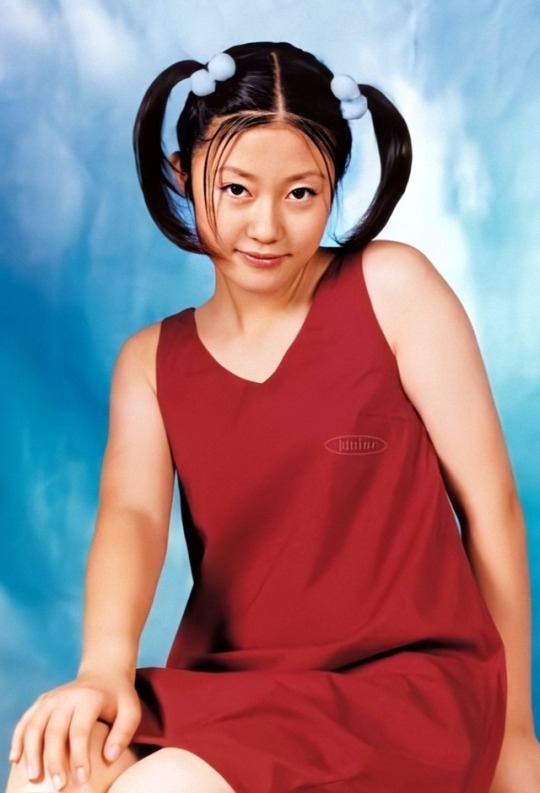
Lee Jihyun of Circle (And later Jewelry)
8 notes
·
View notes
Text
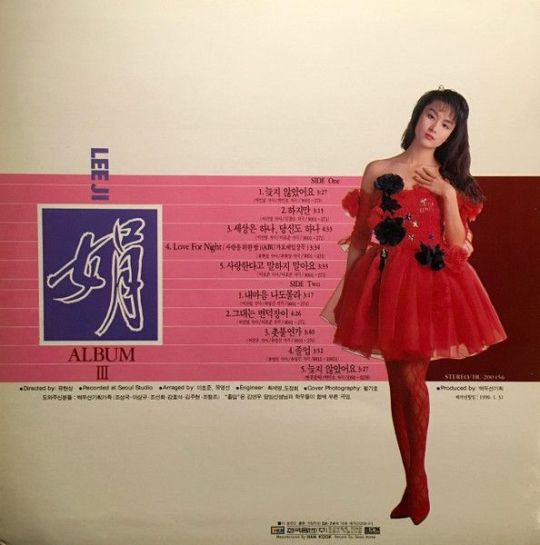
Back side of Lee Ji Yeon's 3rd album. I LOVE love the dress.
4 notes
·
View notes
Text
The Lost 30 Years - Seol Woon-do/ Jin Bo-ra/ Na Hoon-a, etc. (잃어버린 30년 - 설운도/ 진보라/ 나훈아 등) - Episode 11/35 (Pt. 2)
This text serves as part two of the Korean album 'The Lost 30 Years,' featuring artists such as Seol Woon-do, Jin Bo-ra, and Na Hoon-a. The focus will be on the events surrounding the broadcast that took place in 1983, which inspired the creation of this album. For a comprehensive understanding, please refer to part one, which details the album's context, the broadcast's background, program planning, and content. The live broadcast commenced on June 30, 1983, followed by an emergency broadcast relay from July 1 to July 10, 1983, and continued with regular programming from July 15, 1983, to November 14, 1983.
It is important to issue a warning prior to engaging with this episode, as it will address the subject of self-exit.
The stories of the performers
Numerous emotional moments characterized the live broadcast, leading to various incidents, including instances where cast members fainted and announcers struggled to contain their tears. Some cast members sought one another using their Japanese names, reflecting their experiences of having lived in Japan before returning after liberation. Additionally, there were episodes highlighting the challenges faced by many children who returned to Joseon without any proficiency in Korean, making their adjustment particularly difficult.
The siblings who shouted “Manse”
The broadcast on July 3 presents the narrative of Mr. Kwak Man-young (곽만영), highlighting the poignant reunion of his family. Originally residing in Sinmak-eup, Seoheung-gun, Hwanghae-do, the family faced significant upheaval around 1947-1948 when the communist regime seized their property. The eldest sister, Kwak Tam-sil (곽담실), was the first to defect to South Korea, settling in Yongsan-gu. Following the onset of the Korean War, the entire family fled to South Korea. During the January 4th Retreat, they crossed the Han River Bridge and boarded a train at Yeongdeungpo Station. However, due to the destruction of the Han River Bridge shortly after the war began, train services were limited to areas south of the river, leading to a prolonged separation with no communication thereafter. The family's later narrative reveals that two siblings had unfortunately passed away prior to the reunion.
youtube
The reunion scene is frequently highlighted as a poignant symbol in discussions surrounding the program "Finding Separated Families." During this emotional moment, the younger brother, Kwak Man-young, expressed his joy with tears, exclaiming, "Mom and Dad are both alive! Thank you, long live KBS!" This phrase, while not the official title of the Korean Broadcasting System, reflects the public's affection for the network, as he also proclaimed, "Long live the Republic of Korea!" This heartfelt declaration was prominently featured in the following morning's broadcast. The scene encapsulated the essence of 1983, illustrating themes of familial bonds, the joy of reunion, the revelation of parental survival, the oppressive nature of the North Korean regime, and a celebration of the Republic of Korea, which was often leveraged for propaganda during the Fifth Republic. Following the end of the dictatorship in 1987, the interpretation of this scene shifted significantly.
2013, Mr. Kwak Man-young revisited this poignant memory during a broadcast commemorating the 30th anniversary of "Finding Separated Families," alongside Dr. Yoo Cheol-jong (유철종) and announcer Lee Ji-yeon (이지연), reflecting on that pivotal moment in his life. At the age of 79, he shared his memories, although, in contrast to the Heo siblings, he had made fewer appearances in KBS's retrospective broadcasts. This limited visibility highlights the varying degrees of public engagement among individuals involved in the program, as well as the evolving narrative surrounding the reunions over the decades.
"You're not Kim! You're Heo!"
"When I was little, I left you at the barber shop." / "Yes, that's right." "It's cloudy." / "That's right." "(Crying) Oppa!!!!! Now I have no regrets even if I die, Oppa!!! " In the middle, you can hear your brother Heo Hyeon-cheol shouting “Thank you!!!”, but it is buried and hard to hear.
The phrase 'Finding Separated Families' evokes the poignant reunion of siblings Heo Hyeon-cheol (허현철) and Heo Hyeon-ok (허현옥) (Kim Jeong-ae) that took place at approximately 11 AM on July 5th. This moment is characterized by the confirmation of local station connections and includes both interview segments and the direct reunion itself. Notably, this broadcast was also featured in the film Ode to My Father. In this emotional encounter, the younger sister immediately recognized her brother upon seeing him, even before they exchanged details about their lives. Her instinctive reaction was to softly exclaim, "It's you, brother!", highlighting the deep familial bond that transcends time and separation.
The Heo siblings, orphaned by the war, faced a tragic separation after being placed in an orphanage. The younger sister, Heo Hyeon-ok, was adopted by a family operating a barbershop, where she assumed the name 'Kim Jeong-ae' (김정애). In contrast, her older brother, Heo Hyeon-cheol, remained in the orphanage. Their paths diverged when Heo Hyeon-cheol sought out the barbershop, only to discover it had relocated, leading to decades of lost contact. Over time, Heo Hyeon-ok forgot her original name, living in a state of disconnection from her past, while Heo Hyeon-cheol, despite his own struggles, retained memories of Daejeon and wandered its streets in search of his sister.
The emotional turmoil of Heo Hyeon-cheol was poignantly captured when he lamented, "You're not Kim, you're Heo! You have to know your name!" His concern transcended mere genealogical interest; it stemmed from a lifelong quest to locate his sister, hindered by her name change. This situation reflects a broader issue faced by families separated by war, as exemplified by Kim Bok-yeon (김복연) and Jeon Hak-cheol (전학철), who were unable to reunite due to their son's name being altered to 'Maeng Cheol-su' (맹철수). This name change could have resulted from a mix-up during his early separation from his mother or administrative errors in the chaos of war. Ultimately, the siblings' reunion occurred in 1993, a decade after their initial separation.
youtube
The poignant declaration, "Everyone should know how miserable war is!" continues to resonate in broadcasts aimed at reuniting separated families, with the image of an elderly man weeping remaining particularly impactful. This emotional moment underscores the enduring consequences of conflict on familial bonds.
The reunion was facilitated through a connection between local stations in Jeju and Daejeon. On the inaugural day of the broadcast, Mr. Heo Hyeon-cheol rushed to the local station upon seeing Ms. Kim Jeong-ae (Heo Hyeon-ok) featured on screen. The initial connection to Jeju Broadcasting and the subsequent introduction of Heo Hyeon-ok's narrative occurred the following day. Although the local station managed to reconnect after four days for a brief reunion, time limitations restricted the sharing of stories, leading to a poignant moment when the microphone was passed to Jeju guests. Unfortunately, the introduction of their stories was interrupted at KBS Seoul headquarters, necessitating another connection between Jeju and Daejeon for the two to meet. During the live broadcast, the producer incorporated war footage and somber background music, evoking a powerful emotional response. Lee Ji-yeon, the host and a member of a separated family herself, was unable to contain her emotions and left the stage in tears, creating a lasting memory that symbolizes the deep connections between relatives.
The siblings recounted that the younger brother, residing on Jeju Island, took a flight the following day, arriving at Gimpo Airport in Seoul before taking a taxi to Daejeon. Although there was an airfield named Cheongju near Daejeon, it functioned as a military base at that time and was not officially designated as Cheongju International Airport until 1997. At 5:40 PM, KBS Daejeon Broadcasting Station, then known simply as 'Daejeon Broadcasting Station,' was elevated to KBS Daejeon Broadcasting Station on December 8, 1986, following a reorganization within KBS. The headquarters was initially situated in Mok-dong, Jung-gu, before relocating to Manyeon-dong, Seo-gu, in 1998, where Dunsan New Town is located. In the 2020 special documentary 'We Together, That Memories,' Mr. Heo Hyeon-cheol reminisced about the old headquarters, which has since been converted into a nursing hospital, although the transmission tower remains. The emotional reunion occurred in front of the building, where, amidst the citizens' applause, the older brother opened the door before the younger brother's car had fully stopped, leading to an embrace filled with tears. The older brother reportedly wept, exclaiming, "What is this? Who should I tell this good news to? I have to tell my parents!" which deeply moved those present.
The Heo siblings enjoyed a fulfilling life and regularly featured on KBS's program "Searching for Separated Families." In May 2013, they participated in a special broadcast celebrating the 30th anniversary of the show, alongside Dr. Yoo Cheol-jong and announcer Lee Ji-yeon, reflecting on their experiences. Notably, the recording studio for this episode was the same public hall that hosted the original broadcast three decades prior.
As of 2019, Heo Hyeon-cheol, the elder brother, was employed at a funeral home in Daejeon Metropolitan City, while his younger sister, Heo Hyeon-ok, was reported to be residing in Jeju Island. On March 2, 2023, Heo Hyeon-ok appeared on the 9340th episode of KBS 1TV's Morning Yard, which marked the 40th anniversary of "Searching for Separated Families" as part of the 50th anniversary celebration of public broadcasting in Korea. During the broadcast, she shared a poignant dream about her brother, in which he appeared in a trench coat and identified himself, prompting her to join the program.
The son who performed the ancestral rite for his mountain mother
"You are my son.""Mother, how are you alive? I was serving you food."
Among the various reunion episodes of 'Searching for Separated Families', the encounter between grandmother Kang Hak-gi (강학기) and her son Oh Soon-ho (오순호) stands out as the most poignant. This family was torn apart during their escape from the communist forces in Cheorwon amid the Korean War. In a desperate attempt to evade bombings, they, along with others, sought refuge in a bunker. However, during a chaotic evacuation led by the US military, the mother and son were separated, with Oh Soon-ho eventually relocating to Busan, where he built a new life, unaware of his mother's fate for three decades.
The reunion was facilitated by a collaboration between Seoul KBS and Busan, culminating in a touching moment where Kang Hak-gi, despite her advanced age, inquired about her son's name and the names of his siblings. This scene is particularly striking, as it highlights her determination to reconnect with her family. Oh Soon-ho, recalling the distinct features of his younger sister, who was also present in the studio, sought confirmation of their shared past. The emotional climax occurred when the grandmother, recognizing her son after so many years, exclaimed, "You are our son," leading to an outpouring of tears from both her and her daughter, Jeom-soon (점순).
youtube
Oh Soon-ho struggled to contain his emotions, attempting to maintain composure in the face of overwhelming relief and joy. The intensity of the moment caused him to lean on a nearby companion for support as his breathing quickened. His wife, who accompanied him, was equally affected, unable to suppress her tears as they shared in this profound reunion. The scene encapsulates the deep emotional bonds of family and the enduring impact of separation, illustrating the powerful human capacity for love and connection even after years of uncertainty.
In a poignant reunion, an unusual incident unfolded. The son’s family believed that his mother had died during that period. This event occurred three decades post-war, a time when the healthcare system and public services for the elderly were significantly lacking, if not at their lowest point. Reflecting on this, it is remarkable that Grandma Kang Hak-gi, who appeared on television, managed to recover. Even when compared to the elderly of the 21st century, her dental health was notably poor. He mentioned that he was unaware of the ancestral rites day, leading him to prepare the ceremonial meal for his mother during New Year's Day or Chuseok. When his son and daughter-in-law, meeting for the first time on screen, expressed their grievances, he humorously remarked, "You prepared my food? That must be why I lived so long." In Confucian belief, there exists a superstition that conducting a memorial service for a living person can extend their life.
youtube
The video opens with announcer Hwang In-yong (황인용) and talent Kang Bu-ja (강부자) as special guests. Both were previously featured on the television program 'Studio 830' and 'Morning Yard.' The initiative to reunite separated families originated from Studio 830, where Hwang was hosting a radio show titled "Hello, I'm Hwang In-yong and Kang Bu-ja" on KBS. As a weekend program, the regular cast members were on break, allowing these two radio hosts to step in as substitutes. At that time, the radio was simultaneously airing the separated families program on television, resulting in a temporary hiatus for the television segment.
The grandmother's presence infuses warmth into this otherwise sombre reunion narrative. Her light-heartedness and ability to engage with the audience, even amidst the emotional backdrop, foster a sense of connection and relief. The interplay of humour and sentimentality not only highlights the resilience of familial bonds but also underscores the cultural significance of ancestral rites in shaping perceptions of life and longevity. This blend of emotion and levity serves to enrich the storytelling, making the reunion both memorable and impactful.
"Don't worry about living"
Younger brother : Don't worry, brother. I'm doing well. I'm doing well. I'm doing very well on my own without asking anyone for help. Don't worry about it. Older brother : Don't worry about living. Anyway, since we met, we shouldn't break up. Right? Right?
Mr. Im Geum-hae (임금해), known as Kim Gwang-ok (김광옥) at the time, and his elder brother Im Sin-hyo (이민효), residing in Busan, visited the Seoul Broadcasting Station on August 27. The YouTube video inaccurately refers to Im Sin-hyo as Im Sin-woo (임신우). During their meeting, the younger brother, having seen his elder sibling's broadcast in which he sought him out, contacted the station. The striking resemblance between the brothers became evident when the satellite connection displayed the younger brother's face, prompting the elder brother to exclaim, "Oh, right, they look alike," which captivated the audience.
During the war, the younger brother was initially adopted by a deputy chief in Yeongdeungpo but was placed in an orphanage within a year, leading a solitary life until their reunion. He bore a scar on his left side from a burn prior to his adoption, which facilitated their immediate recognition of one another. Just before their meeting, he learned from his adoptive mother that 'Kim Gwang-ok' (김광옥) was the name she had given him, while his true name was 'Im Dol-i.' (임돌이) This prior knowledge of his identity significantly aided him in reconnecting with his elder brother.
youtube
Following the adoption of his younger brother, my sibling was separated from their biological mother and expressed a desire to locate her during a broadcast. My father, who had been traveling between Japan and Korea prior to the war, lost all contact after its conclusion, leaving us unaware of his whereabouts. My brother speculated that our father may have permanently settled in Japan, a country that has seen a considerable influx of Koreans due to the intense political strife and violence that ensued after liberation. Notably, the Jeju 4.3 Incident, which resulted in the deaths of tens of thousands, prompted many Koreans to emigrate to Japan, leading to the establishment of a distinct community for those from Jeju.
The reunion was marked by numerous poignant remarks, including my brother's heart-wrenching statement, "I've been alone in the world all my life, this is how I've lived." This sentiment deeply affected even our typically composed older brother, who could not contain his tears upon witnessing his younger sibling's distress, particularly during their heartfelt exchange. My younger brother, a self-made entrepreneur based in Incheon, is married with children. His wife and son made an appearance on the broadcast, greeting our older brother, which led to the aforementioned conversation. When he revealed that his son's name was Dae-hyeon, announcer Lee Ji-yeon offered her congratulations, noting, "You've been living as Kim Dae-hyeon (김대현) until now, but now you're changing your name to Im Dae-hyeon (임대현)." The emotional atmosphere was further heightened by the playing of the song "Bloodlines We Met Again."
In 2021, the younger brother recounted his story on television, revealing previously undisclosed information, including a reunion certificate issued by KBS at that time, intended for the correction of the family register. Despite a close bond lasting three decades, the older brother's death in 2012 marked a tragic turn. The broadcast suggests that the younger brother continues to use the name Kim Gwang-ok. Notably, even with KBS's issuance of a correction certificate, changing one's name entails altering not only personal but also children's surnames, alongside the necessity to inform business associates and others about the name change, complicating the process significantly. Although advancements in technology have streamlined these procedures, the past presented considerable challenges, leading many to retain their known names throughout their lives. Consequently, individuals from the middle-aged demographic and older often possess discrepancies between their official family register names and the names they are commonly addressed by, resulting in a tendency to accept the knowledge of their original names without pursuing formal changes.
Other Miscellaneous Matters
On the afternoon broadcast of July 2, a poignant scene unfolded in the studio when a family reunion led to an emotional collapse. The daughter, who had endured the loss of her parents during an evacuation and had subsequently lived a challenging life as a housekeeper, was now middle-aged and overwhelmed with grief upon reuniting with her family. She cried out, "Why did you abandon me?" This emotional turmoil caused her mother, in her seventies, to faint from shock. Fortunately, she was quickly taken to the emergency room and recovered.
youtube
During this distressing moment, announcer Kim Dong-gun (김동건) took charge, urging those present to remain still and called for assistance from the infirmary. He emphasized the importance of not moving someone who has fainted without proper guidance. The live broadcast captured the raw emotions of the moment, with tears flowing as the audience witnessed the family's heartbreak, prompting a collective response of sorrow across the nation.
The following day, the broadcast continued to address the incident, with announcers attempting to soothe the guests by highlighting the mother's high blood pressure and urging calmness. This event was later documented in the April 22, 1995, edition of the Saturday Newspaper, which featured an article titled, "Who Doesn't Know This Person?": Sobbing… Heartbreak… A 'Human Drama' Without Direction. Additionally, it was revisited in a special Modern Korea broadcast on September 3, 2020, where Kim Dong-gun reflected on the emotional weight of separation, drawing from his own experiences as a displaced person from Hwanghae-do.
------------------------------------------------------------------------------
youtube
On the October 1 broadcast, Lee Kang-hoon (이강훈), a resident of Busan, travelled to Yeouido with his wife and their six-year-old son to celebrate his mother-in-law's birthday. He expressed that financial constraints had initially prevented them from attending. A fortunate incident occurred when the son unexpectedly encountered his brother at Yeouido Plaza after spotting a piece of paper bearing their father's name. At that time, it was common for six-year-olds to struggle with reading Korean. This situation raised questions about whether the children's upbringing or their inherent intelligence contributed to their respectful behaviour. The child's father took pride in sharing this story throughout the broadcast.
------------------------------------------------------------------------------
The Park sisters experienced separation following their father's venture into business, leading to their placement in different adoptive homes due to post-war financial struggles. One of the sisters was reportedly adopted by the poet Noh Cheon-myeong (노천명), yet her experience was marred by hardship, as she was compelled to serve as a maid despite the arrangement being labelled as adoption. I encountered these sisters during the broadcast on July 9.
------------------------------------------------------------------------------
Numerous families encountered by one of the broadcasters during registration were found in the public hall or Yeouido Plaza. While not all were required to appear on the broadcast, some received invitations to the public hall. One guest recounted an incident where they noticed someone removing posters, prompting them to inquire about the action, only to discover a placard bearing the same name as theirs, leading to a reunion with their aunt. Another guest shared a story of an older brother who posted a notice seeking his younger sibling; shortly thereafter, the younger sibling attempted to post a similar notice below it and was overwhelmed to find a paper with his name, resulting in their reunion. Additionally, some siblings, seated next to each other during the story's introduction, recognized the striking similarities in their placards, which ultimately facilitated their reunion after verification.
youtube
Many individuals were separated from their families at a young age, often retaining only fragmented memories, such as names or even lacking recollection of their own identities. Those fortunate enough to remember specific details, like a prominent tree in their village or the location of a relative's home, found solace in these memories. Physical traits, including scars and marks from wartime experiences, served as additional anchors to their past. Some families recounted poignant moments, such as a sibling recalling an incident involving a rock, while others searched for lost loved ones by identifying unique physical characteristics, like a scar on a child's head.
In various instances, individuals recognized each other through visual cues, often facilitated by local media. For example, siblings Heo Hyeon-cheol (Heo Hyeon-cheol) and Heo Hyeon-ok (허현옥) experienced an emotional reunion when she immediately identified him upon seeing his face, exclaiming, "It's my brother!" This recognition was heightened by their striking resemblance. However, the passage of time had altered their appearances and memories, leading to complexities in their identities, as exemplified by her belief that she had been "adopted by a barbershop on a cloudy day." Such experiences underscore the profound impact of memory and the changes that accompany aging.
------------------------------------------------------------------------------
Numerous instances of family separation occurred following the Korean War, particularly among those who returned to Korea immediately after liberation or defected to South Korea post-38th parallel division. This phenomenon was notably prevalent among families residing in Gyeonggi, Gangwon-do, and parts of Hwanghae-do. Individuals with ancestral ties to regions such as Jilin Province in Manchuria, Sakhalin, Hwatae, or Karafuto may now find these connections unfamiliar. Furthermore, the topic of 'population movement by era,' often overlooked in Korean geography and history textbooks, starkly illustrates the profound tragedies experienced during this period. Notably, individuals who had left behind separated families in China were able to reunite when tourism to China was permitted in 1988.
Among the narratives presented, the National Defence Corps is primarily referred to as the "Second National Soldier." Numerous accounts detail the efforts of individuals seeking those who vanished after conscription. While there were some fortunate reunions, the overwhelming tragedy experienced by the National Defence Forces during that period suggests that many of the drafted soldiers likely perished in the conflict. The National Guard gained infamy for unprecedented military corruption, leading to widespread suffering, starvation, exposure, and disease among soldiers before they could even participate in battle. Notably, there was an instance of an individual who remained unaccounted for despite being confirmed as having the same name on three separate occasions, highlighting the failures in verification processes.
youtube
During a meeting among siblings, Kim Il-sung of North Korea exclaimed, “Inomushikiya!!! Do you know this fact!!!” This provoked a passionate response from Heo Hyeon-cheol, who urged everyone to unite against Kim Il-sung, declaring, "Everyone! Let's all come out together and defeat Kim Il-sung!!" Some attendees even entered the studio brandishing the Taegeukgi. Many individuals present, particularly those in their 30s and older, had directly experienced the war, perceiving Kim Il-sung as a formidable adversary. This sentiment was especially prevalent among those born before the early 1950s. By 1983, even individuals aged 30 had been born during the conflict, and the older generation's animosity was well-established. As of the 2020s, many from this demographic are now in their 70s or older, maintaining a strong hostility towards the North Korean regime and remaining vigilant regarding security matters. This group also exhibits the highest levels of support for conservative parties that advocate a robust anti-North Korean stance, including an actor who, in his later years as a sergeant, sought vengeance against Kim Il-sung.
The release of the film Ode to My Father in 2015, which focused on the theme of separated families, sparked controversy due to a scene featuring an extra walking through Yeouido Plaza while holding both the Taegeukgi and the North Korean flag. At that time, the National Security Act was still in force, meaning that the act of displaying the North Korean flag, as shown in the film, could have led to immediate arrest, and there was a significant risk of violence from displaced individuals. Additionally, the narrative included a grandmother searching for her 14-year-old son, Lee Dae-sik (이대식), who had vanished while delivering newspapers in Seoul following the January 4th Retreat. A broadcast by SBS on March 28, 2015, titled "Child Agents in the North - We Were Bullet Candidates," revealed that he had been chosen as a child agent and sent to North Korea.
youtube
Eyewitnesses have reported sightings of him in a political prison camp, and six decades after he went missing, the state announced that he had died in 1952. Among the cases recalled by Seol Woon-do (설운도), one individual appeared on a broadcast dressed in mourning attire. This guest's mother, a member of a separated family, had been visiting the KBS open hall daily in search of her lost relatives, but she passed away. Despite the mourning period, he chose to be in the studio to fulfil her wishes, hoping that the family she sought might appear.
------------------------------------------------------------------------------
Shortly after the broadcast commenced, an elderly man residing in Dongjak-gu, Seoul, tragically took his own life. His son revealed that the man had left behind his wife and three siblings in the North during the January 4th Retreat, defecting to the South alongside his younger brother. Overcome with emotion while watching the broadcast, he exited his home around 5:30 PM on July 2nd, ultimately ending his life in silence.
The narrative surrounding the three siblings is equally poignant. During the Korean War, they were ostracized as Japanese and sought refuge in a cave, which served as an air-raid shelter constructed by the Japanese military using Korean labour towards the end of the Pacific War. Following the devastation of Japanese cities by U.S. strategic bombings, many individuals were left homeless, residing in such shelters. Their parents had passed away, leading the siblings to work as servants, while their younger sister, Heo Shin-ja, battled typhoid fever. After moving to Seoul due to their maternal aunt's neglect, the siblings faced further hardship, culminating in the younger sister's flight from home and subsequent estrangement. Notably, her enduring resentment towards their aunt remains palpable, as evidenced by her vehement outburst towards her brother regarding their aunt's well-being.
The three siblings habitually refer to one another using their Japanese names. The younger sister's official name, "Shin-ja," corresponds to the Korean pronunciation of the Japanese name Nobuko (信子). The second eldest brother is named Isamu (勇), while the eldest brother is called Yoshi (芳). Given that their Korean names are derived from Japanese names articulated in Korean phonetics, it is plausible that the eldest brother's name '芳 (Bang)' is pronounced Yoshi in Japanese. During a broadcast, when asked about his Korean name, he identified himself as "Heo Bang." However, the video does not provide conclusive evidence regarding the nationalities of their parents.
The siblings' maternal uncle held the rank of lieutenant colonel in the South Korean Army, suggesting that their mother was likely Korean and their father Japanese. There have been instances where Japanese individuals visited the studio or sent correspondence in search of their families. These cases primarily involved individuals who had worked in local government or had been dispatched to colonies like Joseon or Manchukuo during the Japanese Empire. Many were separated from their families after becoming hikiagesha following the war's conclusion. Some families, like the Heo Shin-ja siblings, experienced separation due to the complexities of Japanese-Korean identity. After diplomatic relations were established between China and Japan, some hikiagesha families in Manchukuo were able to reunite and obtain Japanese citizenship, but faced racial discrimination upon returning to Japan, leading many to relocate back to China or become involved in organized crime. Others who struggled to find a place faced persecution from the government, as exemplified by the situation at Narita Airport.
------------------------------------------------------------------------------
A woman, whose lineage includes parents and grandparents active in the independence movement, discovered her aunt.
In another instance, five siblings separated during the Korean War were successfully reunited via this broadcast.
Additionally, a family that accumulated wealth from their father's labour prior to the Korean War contributed food aid to the national army, while some siblings were labelled as reactionaries by the People's Army due to their capitalist ties and subsequently defected to South Korea. (Link 1 & 2 to two episodes from the broadcast)
------------------------------------------------------------------------------
I must admit that after viewing several videos related to this episode, I found myself moved to tears. Given the extensive nature of this broadcast and the wealth of information it contains, a part 3 will be produced for this album and broadcast.
#Youtube#80s#80s music#KBS#The Lost 30 Years - Seol Woon-do/ Jin Bo-ra/ Na Hoon-a ect.#잃어버린 30년 - 설운도/ 진보라/ 나훈아 등#The Lost 30 Years#잃어버린 30년
4 notes
·
View notes
Video
youtube
September 3rd, 2002 Isak N Jiyeon released their only album: Tell Me Baby
Isak N Jiyeon (이삭 N 지연) was a duo made up of Kim Isak (김이삭) and Lee Jiyeon (이지연). Jiyeon was from the group The Grace and Isak had previously been featured on SM Town’s albums. The duo only released one album together.
Honorable Mentions: 2004 - Kim Gun-mo (김건모) - KimGunMo. 9 His ninth album, with the single: ‘‘Nagging’‘ 2005 - Lee Min-woo (이민우) - Ilnd Winds His second album, with the single: ‘’Bump’’ 2005 - M To M (엠투엠) - M TO M Their second album, with the single: ‘’Three Letters’’ 2008 - U-Kiss (유키스) - New Generation Their first EP, with the single: ‘’Not Young’’
#kpop of the day#isak n jiyeon#이삭 N 지연#2002#2000s#duo#gg#short lived#김이삭#kim isak#isak#이지연#lee ji yeon#jiyeon#이민우#2005#lee min woo#m#김건모#kim gun mo#2004#엠투엠#m to m#유키스#u-kiss#2008
2 notes
·
View notes
Text
7080 추억의 노래 모음 45곡
7080 추억의 노래 모음 45곡
#젊은 미소(건아들) #못다핀 꽃 한송이(김수철) #스잔(김승진) #그날(김연숙) #오늘밤(김완선) #내가(김학래,임철우) #비처럼 음악처럼(김현식) #찻잔(노고지리) #새벽기차(다섯 손가락) #연)라이너스 #바다새(바다새) #연안부두(박강선) #오늘같은 밤이면(박정운) #경아(박혜성) #비와 찻잔 사이(배따라기) #슬픈 계절에 만나요(백영규) #홀로 된다는 것(변진섭) #나 어떡해(산울림) #청춘(산울림) #남재는 배 여자는 항구(심수봉) #젊은태양(심수봉) #아침이슬(양희은) #홀로된 사랑(여운) #잃은버린 우산(우순실) #황홀한 고백(윤수일) #꿈의 대화(이범용,한명훈) #담다디(이상은) #갈등(이선희) #목로주점(이연실) #내이로 가는…

View On WordPress
1 note
·
View note
Photo
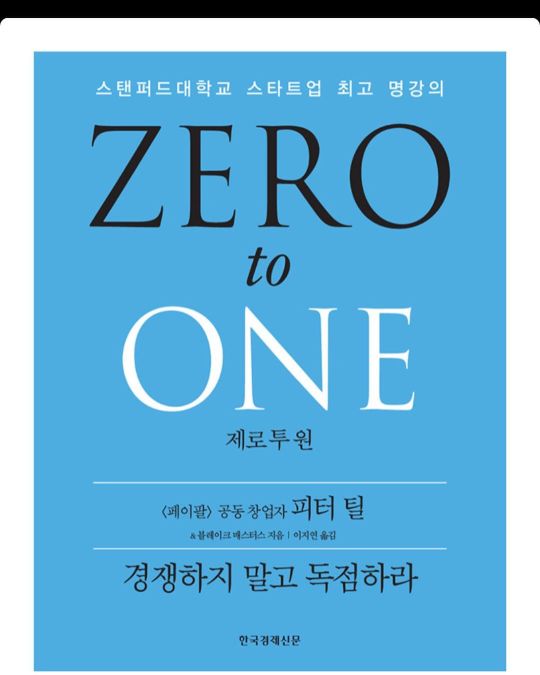
이 책은 2012년 스탠퍼드대에서 #스타트업 기업에 관한 특별 강의를 했던 #피터틸 과 그 강의 노트를 #블로그 에 게재한 브레이크마스터가 공동 저자이다 この本は、2012年にスタンフォード大学でスタートアップ企業に関する特別講義をしていた#peterthiel とその講義ノートをブログに掲載した#blakemasters が共同著者である #사업 계획을 세울 때는 그 사업이 획기적인 기술을 만들 수 있는가/지금 시작할 적기인가/작은 시장에서 독점할 수 있는가/좋은 팀을 갖고 있는가/제품을 판매할 방법을 잘 갖고 있는가/현재 위치를 20년 정도 방어할 수 있는가/타인이 모르는 독특한 기회를 포착했는가 에 답할 수 있어야 한다 事業計画を立てる時は、その事業が画期的な#技術 を作ることができるか/今始めるタイミングか/小さな市場で独占することができるか/良いチームを持っているか/製品を販売する方法をよく持っているか/現在位置を20年ほど防御することができるか/他の人が気づいてない機会を捉えたかに答えることができなければならない 새로운 것을 창조하여 세상의 풍요로움을 가져다 준 독점 #기업 은 그 보상으로 경쟁을 피하고 독점 이윤을 획득할 수 있다 新しいものを創造して世界の豊かさをもたらした独占企業は、その報酬としての競争を避け、独占利潤を獲得することができる #translated #이지연 #한국경제신문사 #globalization #technology #microsoft #paypalmafia #perfectcompetition #monopoly #google #paypal #shakespere #oracle #apple #amazon #facebook #powerlaw #lastmover #tesla #palantir #life #세줄평 20/12/29-21/1/17 (矢田川) https://www.instagram.com/p/CKJXeiul2_H/?igshid=ijo5hhpelzhr
#스타트업#피터틸#블로그#peterthiel#blakemasters#사업#技術#기업#translated#이지연#한국경제신문사#globalization#technology#microsoft#paypalmafia#perfectcompetition#monopoly#google#paypal#shakespere#oracle#apple#amazon#facebook#powerlaw#lastmover#tesla#palantir#life#세줄평
0 notes
